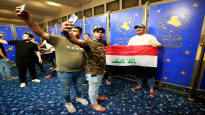There have been attempts to form a government in Iraq since the elections held in October without success. Due to the political impasse, the country is now stuck in place.
The protesters who rushed to the parliament on Wednesday night managed to break past the security guards present and take over the building. Riot police tried to prevent the protesters from entering the parliament with water cannons and tear gas.
According to the news channel al-Jazeera, protesters had arrived from several Iraqi cities. Demonstrators also invaded the so-called “green area”, where the country’s administrative buildings and diplomatic missions of foreign countries are located.
Prime minister Mustafa al-Kadhimi demanded the protesters to withdraw from the area immediately.
The protesters who took over the parliament building are Shiite politicians Muqtada al-Sadr supporters. His forces won the largest number of votes in the October parliamentary elections, i.e. 73 seats in the country’s 329-seat parliament. However, it has not been possible to form a government in the country for more than nine months.
Hundreds of protesters set off when the Prime Minister was about to be appointed Mohammed Shia al-Sudan, which protesters see as having too close ties to Iran. Al-Sadr has wanted to reduce the influence of Iran and the United States on Iraq’s domestic politics, the BBC reported.
System update failed
Iraq expert and current SDP member of parliament Hussein al-Taee says that power in Iraq has traditionally been shared based on consensus on ethnic grounds, for example in such a way that Sunnis, Shiites and Kurds get something and the chairs just change.
– This is the big framework regardless of what the election result is. This is such a circus of democracy, at the end of which the power remains in practice with the power elite.
Al-Taee says that the system prevents the country from developing and anchors the corruption rooted in the country even deeper.
As another point, al-Taee mentions that the situation in neighboring countries and the influences from there are also reflected in Iraq’s politics.
Al-Taee says that after getting a significant election victory after last October’s elections, al-Sadr has tried to form a government in a way that deviates from the usual formula, so that a real opposition would also form in the country.
In Al-Sadr’s plan, the government would be formed according to the election results and not according to how the cake has been distributed in the past.
– He wanted a genuine opposition to be born in the parliament, which would push the government forward and not so that there is a minister from every political party.
However, the idea did not materialize.
– The situation ended with his MPs resigning and being replaced by deputy MPs from other parties. Now he is out of this official political system.
The waiting people suffer
Since the country has not been able to form a government, Iraq has also not been able to make a budget for the current year. The political impasse has made the living conditions of the people even more miserable, as the required economic reforms and infrastructure projects have not been launched.
– People are angry in Iraq. They are disappointed and there are a lot of young people. There is huge unemployment, says Al-Taee.
– Many young people are now educated, some even at university, and they have been promised jobs. They haven’t been able to get that job and the private sector is lagging behind, he continues.
Al-Taee says that a disaffected young population is fertile ground for inciting resistance.
– These young people feel that their cries are not answered and therefore it is very easy to incite these people even to violent resistance.
There have been repeated protests in Iraq over the years. How the situation will develop now is still open.
Al-Taee says that violent demonstrations can also break out in the country. This can happen if third parties are involved, who get to incite conflicts between ordinary people and, for example, the police, army or anti-terrorist forces.
Al-Taee sees that the only way out of the impasse is to continue negotiations.
– The way out of the impasse would be for the current power elite, with the exception of al-Sadr, to choose a prime minister and form a government that al-Sadr is satisfied with or able to work with.
The demonstration was a message
Hours after the seizure of parliament, al-Sadr wrote on the instant messaging service Twitter that the protestors’ message had been heard and they could return to their homes. After this, the protesters left the building.
According to many experts, yesterday’s statement was intended to send a message.
– Maybe this was a message that those old names who want to return to the position of prime minister are not welcome, because it is not possible to cooperate with them, al-Taee estimated.
– I believe that the current prime minister’s name is also on the list and he could possibly continue for a few more years until there are new elections.
Al-Taee says Iraq’s curse is oil. Now the increased oil price has also rained into Iraq’s coffers.
He points out that Iraq should already prepare for the fact that within twenty years the oil income may stop.
– Now the cash from oil is the last that Iraq will receive and it should be used to reform the country. If it is not done, it is unclear where the country’s 25 million young people will go.
The people of Iraq are quite young. About 70 percent of the residents are under thirty.
– Iraq must wake up to the post-fossil world so that it is not too late, al-Taee concludes.
